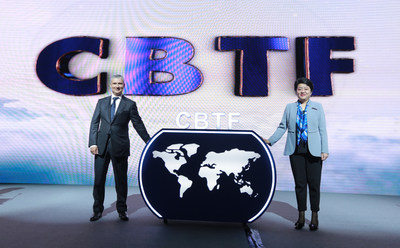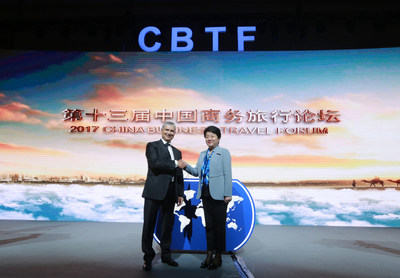Business Travel in China Continues to Grow, as Chinese Companies Increasingly See Client-Facing Travel as a Key Revenue Driver
CITS American Express Global Business Travel 2017 China Business Travel Barometer indicates that Belt and Road opportunities are considered a key factor in rising business travel budgets
SHANGHAI, Oct. 17, 2017 /PRNewswire/ -- The CITS American Express Global Business Travel 2017 China Business Travel Survey (the Barometer) has revealed that 31% of Chinese companies expect travel budgets to rise over the next twelve months. The figure reflects increasing business confidence, as only 17% of respondents predicted budget increases when asked the same question last year. Forty percent of organizations have reported plans to expand budgets because of opportunities presented by the Belt and Road initiative. These results were released during the thirteenth annual China Business Travel Forum (CBTF), held in Shanghai today.


Last year, China became the country with the largest business travel expenditure in the world, overtaking the United States*. Despite 75% of China's business travel spend being domestic**, its increasingly outward looking approach to global commerce is likely to create opportunities for international business travel in future. China's Belt and Road Initiative*** is one such example of a major investment project that could benefit Chinese organizations with an international travel program (43% of companies), as well as those with a regional program (21% of companies).
"The results of this year's China Business Travel Barometer are hugely positive, and a strong indication of the opportunities Chinese organizations are recognizing both domestically but also in the global economy," said Kevin Tan, Vice President of CITS American Express Global Business Travel.
"While our research indicates an intent to increase business travel budgets over the next year, when we look deeper we find that the intention to increase spending also comes with some strategic reallocation of expenditure. This is particularly noticeable when considering the number of organizations that have reported plans to reduce spend on internal meetings. It is apparent that businesses continue to acknowledge the importance of client-facing travel."
Financial returns from business travel are clear and measurable
This year's Barometer highlighted the importance of business travel as a key driver of revenue for many Chinese organizations, with 90% reporting that increased client-facing travel would likely increase revenue. Additionally, more than half of the respondents (53%) believe an increase in client-related travel would improve overall revenue by 10-20%. Developing new business relationships, and maintaining existing clients were also listed as the top two reasons for business travel.
Beyond simply acknowledging the value of business travel to overall company bottom line, most of Chinese organizations also reported having systems in place to measure the return on investment (ROI) of business travel. Forty one percent of organizations currently track the level of business travel expenditure required to sign a new business deal on a monthly basis. More than half of companies also claimed to measure business travel ROI by linking business travel spend to company revenue, reviewing T&E programs with C-level management, regularly aligning travel program with business strategy, and linking business travel spend to converting prospects or maintaining client relationships.
Interestingly, almost half of the respondents (46%) in this year's Barometer say their company could save 10-20% of their total travel budget from better budget management. Twenty percent of larger companies also stated they are likely to replace close to half of all internal meetings with video or teleconferencing within the next year.
In addition to saving money from better budget management, many companies also identified indirect costs and opportunity costs as key areas of focus. For example, 40% of companies reported requiring pre-trip approvals by manual paper or email, which can lead to inefficiencies compared with automated processes.
"The research tells us Chinese companies believe there are savings to be identified within their current travel budgets, and that many intend to put measures in place to realize some of these savings in the next year. When we consider the belief among many organizations that client-facing business travel drives revenue growth, it will be interesting to see whether companies look to strategically reallocate their business travel savings to other areas of the travel program," said Mr. Tan.
Organizational goals must be balanced with traveler experience concerns
The voice of the traveler seems to be growing in importance again this year, with the Barometer revealing Chinese organizations currently view their comfort and wellbeing as being equally important to cost, while safety considerations are most important.
Inflexible travel policies (30%) and complex reimbursement processes (23%) were reported as the top two complaints for business travelers. With 30% of companies reporting travel policy compliance below 75%, steps which improve overall traveler experience could increase compliance and reduce overall costs.
"Companies that balance traveler concerns with appropriate cost saving measures are the most likely to see a significant financial benefit. The Barometer's findings indicate that the strictest cost-savings measures, such as an inflexible travel policy, are likely to result in false-savings due to lower policy compliance," said Mr. Tan.
New technologies must be balanced with operational realities
Many Chinese organizations (58%) have identified new technology and tools as a means for creating cost savings in their travel budgets. Other cost saving strategies identified by Chinese companies included streamlining costs through enhanced negotiations with suppliers (60%), and improving communication of travel policy (59%). Savings through enhanced negotiations with suppliers was considered a greater priority among smaller companies (70%) than larger companies (43%), indicating they could likely benefit from a travel management company negotiating on their behalf.
"Emerging technologies are enabling companies to reconsider their approaches to business travel. While tools such as videoconferencing have created new opportunities, this hasn't replaced the value of face-to-face meetings. Every business is different and companies need to ensure their travel program is tailored to a company's specific needs," said Mr. Tan.
The Barometer is an annual report detailing the status of, as well as forecasts for, China business travel. The 2017 Barometer surveyed executives from 150 companies in China, ranging from small enterprises with 200 employees to large companies with well above 1,000 staff. These organizations are in major economic areas, such as Shanghai, Beijing, Guangzhou, as well as tier two and tier three cities.
About CITS American Express Global Business Travel
Established by American Express and China International Travel Service (CITS) in 2002, CITS American Express Business Travel was the first Sino-US business travel joint venture in the People's Republic of China. With offices in Beijing, Shanghai and Guangzhou, the joint venture provides a wide range of business travel management services to optimize business travel investments for multi-national corporations and regional, and domestic companies throughout the People's Republic of China. Learn more at www.citsgbt.com
CITS American Express Global Business Travel ("GBT") is a joint venture that is not wholly-owned by American Express Company or any of its subsidiaries ("American Express"). "American Express Global Business Travel", "American Express" and the American Express logo are trademarks of American Express, and are used under limited license.
About American Express Global Business Travel
American Express Global Business Travel (GBT) equips companies of all sizes with the insights, tools, services and expertise they need to keep their travelers informed, focused and productive while on the road. With approximately 12,000 employees and operations in nearly 120 countries worldwide, American Express GBT empowers customers to take control of their travel programs, optimizing the return on their travel and meetings investments, while, more importantly, providing extraordinary traveler care.
Learn more at amexglobalbusinesstravel.com and amexglobalbusinesstravel.com/content/. Follow us @ twitter.com/amexgbt.
American Express Global Business Travel (GBT) is a joint venture that is not wholly owned by American Express Company or any of its subsidiaries (American Express). "American Express Global Business Travel," "American Express" and the American Express logo are trademarks of American Express and are used under limited license.
Source for all figures in release: CITS American Express Global Business Travel 2017 China Business Travel Survey (the Barometer).
* According to the GBTA BTI™ Outlook – China 2016 H1, a report by the GBTA Foundation.
** Announced in 2013, The Belt and Road Initiative is a Chinese-led development strategy designed to strengthen economic relations across East Asia, Europe, Africa and the Middle East. Through an investment projected to surpass US$1 trillion, the plan will deliver infrastructure such as roads, railways, telecommunications, energy pipelines, and ports, to over 60 countries.
*** Includes Mainland China, Hong Kong, Taiwan and Macau.
SOURCE CITS American Express Global Business Travel
WANT YOUR COMPANY'S NEWS FEATURED ON PRNEWSWIRE.COM?
Newsrooms &
Influencers
Digital Media
Outlets
Journalists
Opted In
Share this article